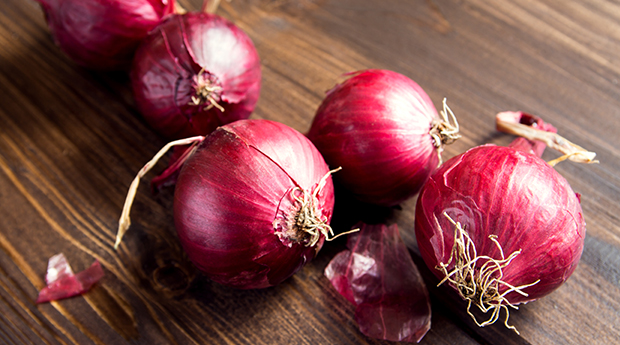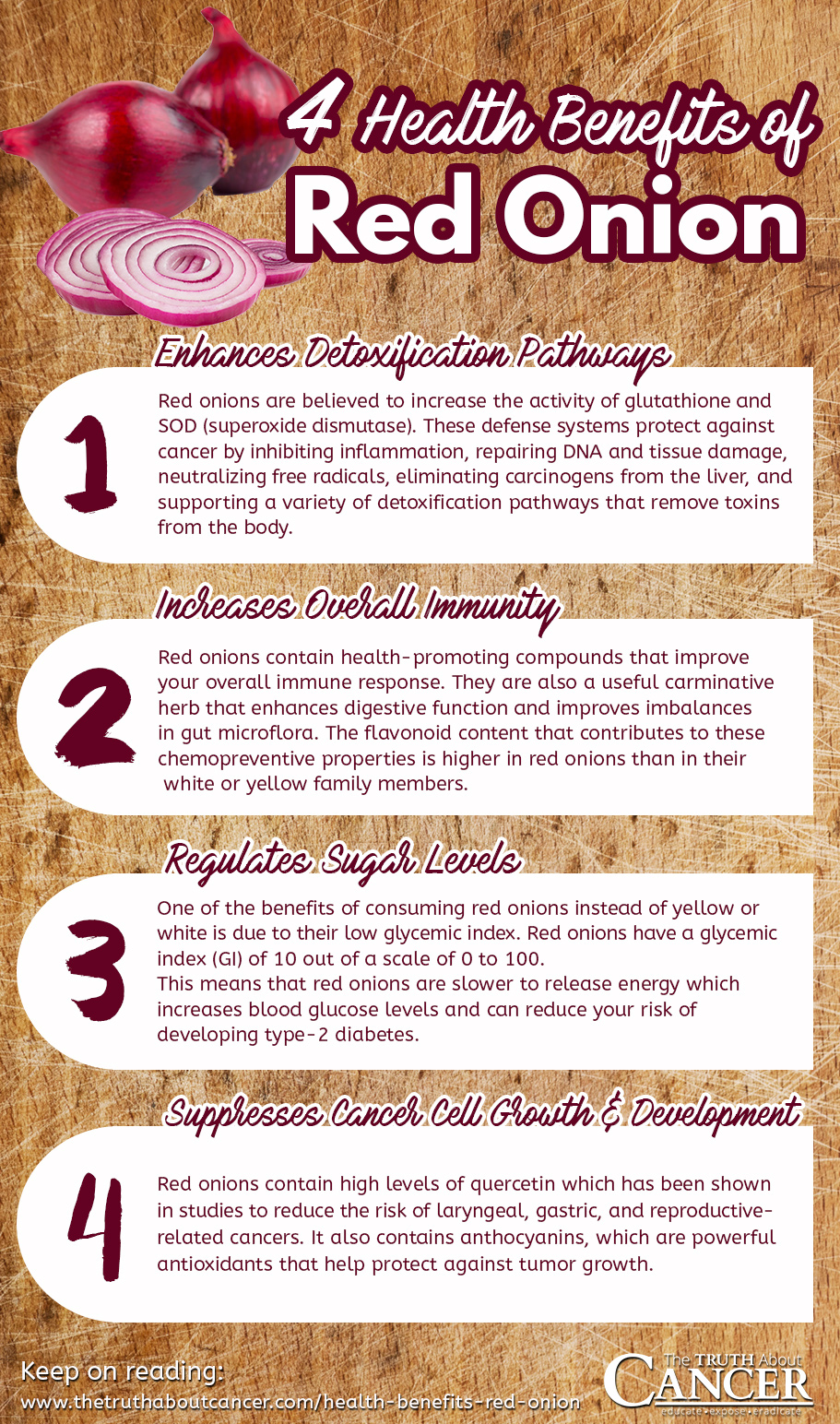
The use of onions for medicinal treatment of illnesses related to bacteria, viruses, fungus, and chronic disease dates back to Egyptian healing practices recorded centuries ago. However, red onions deserve special attention because they are one of the best sources of cancer-fighting nutrients that are limited in the modern American diet.
Today researchers believe that up to 40% of cancers are preventable with a change in dietary habits alone. The compounds and dietary nutrients found in red onion are associated with a decrease risk in developing prostate, colorectal, stomach, and numerous other cancers.
Read on to learn what makes red onions so effective at improving health and how they can help reduce your cancer risks.
What are Red Onions?
Thoughts of their distinctive odor and teary eyes probably comes to mind when you think of slicing into an onion, but how about red onions? Red onions are different than other varieties of onion such as the sweet Vidalia onion and the milder flavor white onion.Aside from their flavor and color, red onions won’t make you cry and they also contain different compounds that can inhibit cancer growth. They are part of the collective family of flowering plants belonging to the allium family, known for their rich content in sulfur containing amino acids. This vegetable family has been extensively studied for its protection against degenerative diseases like cancer.
Read on for 4 key health benefits of red onions…
Health Benefit #1: Enhances Detoxification Pathways
The total antioxidant profile of red onions is suggested to increase the activity of powerhouses like glutathione and SOD (superoxide dismutase). These defense systems protect against cancer by inhibiting inflammation, repairing DNA and tissue damage, neutralizing free radicals, eliminating carcinogens from the liver, and supporting a variety of detoxification pathways that remove toxins from the body.The high sulfur content of red onions alone supports the body’s natural ability to detox. Sulfur stimulates several anti-inflammatory processes which promote healing by enforcing antioxidant defenses. Sulfur is one of the best chelating agents that binds with heavy metals in the blood and flushes these toxins from the body. Sulfur is essential to the health and activity of hormones, enzymes, nerves, and red blood cells.
Any interference with these biological processes can lead to the accumulation of carcinogens and the increased inflammation and tissue damage that consequentially increase cancer risks.
Onions are also rich in quercetin, a powerful bioflavonoid. Quercetin aids in the removal of excessive estrogen levels from the body. This antioxidant also stimulates liver function to detoxify estrogen and other carcinogenic agents. Cancer cells of the uterus, breast, ovaries, and prostate are associated with having receptors for estrogen to bind.
Quercetin also exhibits structural similarities to estrogen making them a possible anti-cancer therapy treatment to target breast cancer cells.
Health Benefit #2: Increases Overall Immunity
Red onions contain health-promoting compounds that improve your overall immune response. Both nutritive and non-nutritive compounds found in red onions act on the body using antibacterial, antifungal, and antiviral effects to reduce the burden on the immune system. The flavonoid content that contributes to these chemopreventive properties is higher in red onions than in their white or yellow family members.Allicin is an antioxidant compound abundantly concentrated in red onions. Allicin is effective at destroying pathogens that weaken the immune response and support cancer development. It combats fungus, bacteria, and viruses. For these reasons red onions are a useful carminative herb that enhances digestive function and improves imbalances in gut microflora.
Along with improving natural abilities to detox, quercetin also has a major impact on reducing inflammation. Quercetin is such a strong anti-inflammatory agent that supplements of this compound are marketed to improve the inflammatory immune cell response associated with histamine release.
Health Benefit #3: Regulates Sugar Levels
One of the benefits of consuming red onions instead of yellow or white is attributed to their low glycemic index. Red onions have a glycemic index (GI) of 10 on a scale of 0 to 100. This means that red onions are slower to release energy which increases blood glucose levels. Eating foods which don’t raise blood glucose if beneficial in preventing the development of type-2 diabetes.Impaired glucose metabolism is one known contributor of cancer development. Maintaining stable insulin levels is critical to preventing physiological processes that can contribute to cancer. The low GI of red onions is associated with lowering blood pressure, increasing blood flow, inhibiting atherosclerosis (the hardening of the arteries), and also assists in regulating fat cell formation.
These vascular health benefits significantly reduce cancer risk because they are linked with an improvement in metabolism. This impacts hormone function and the health of reproductive organs.
All of this combined with the anti-inflammatory properties of quercetin allow red onions to help to neutralize free radicals that contribute to DNA damage, abnormal cell activity, and cancer growth.
Health Benefit #4: Suppresses Cancer Cell Growth and Development
The high levels of quercetin in red onion was given the credit in certain studies for protecting against laryngeal and gastric cancer, as well as reproductive-related cancers.Protects against Mutant p53 Activity
Anthocyanins are a naturally occurring compound that give red onions their red hued purple color.Anthocyanins act as a powerful antioxidant weapon in the fight against a mutant gene called p53 that causes oxidative stress and is associated with tumor growth. Anthocyanins in red onion naturally inhibit the destruction that the abnormal functioning p53 gene can cause on cells and tissue.
Inhibits Tumor Growth & Metastasis

The pigmenting compounds in anthocyanins are also partly responsible for the protective effects red onions exert against tumor growth. Anthocyanins suppress a cancer cell’s ability to migrate and form
tumors by inhibiting angiogenesis. Angiogenesis is the growth of new blood vessels that cancer cell’s
use as an energy source to grow. By inhibiting angiogenesis, cancer cells cannot form tumors or spread to new areas of the body.The super nutrient quercetin again reveals its powerful antioxidant potential.
Quercetin is so effective at scavenging free radicals that it possesses the ability to prevent tumor cell growth. These influences have been reported in breast cancer cells to induce apoptosis (“cellular suicide”) and activate a cyclin-dependent kinase inhibitor (p21) that shuts down many of the influences that enables cancer cells to proliferate.
The loss of expression or abnormal activity from p21 is implicated at increasing the risk of invasive cancer growth and is associated with the following cancer types:
- Colorectal
- Tonsil
- Gastric
- Breast
- Ovarian
- Esophageal
- Oral
- Lung
- Pancreatic
- Laryngeal
- Bladder
- Gliomas (tumor formation in the brain and spinal cord)
- Cervical
- Squamous cell carcinoma (skin cancer)
3 Recommendations to Reap the Most Benefits of Red Onions:
As with many foods, there are tricks to cooking red onions to receive the greatest health benefits. Here are a few tips you can utilize to ensure that you are receiving the highest amount of nutrients from red onions in the kitchen:- The majority of the anthocyanin content is in the red skin of the onion. Avoid over peeling the onion and throwing these cancer-fighting compounds in the compost.
- The allicin compound in onions is released only when the onion is chopped or crushed. Like garlic, it is beneficial to activate the allicin compound by slicing into an onion a few minutes before adding it to recipes.
- Heat degrades many of the antioxidants in red onions. Eating them uncooked as often as possible optimizes the nutrients you are consuming. Consider cooking red onions at a low heat and avoiding high temperatures to limit nutrient loss.
Getting More Health Benefits From Red Onions
How will you include red onions into your diet to reduce your cancer risks? Here is a list of ways that you can add red onions to your diet every day:- Add to chili recipes or use as a topping
- Finely slice into salads
- Combine into homemade slaws or pickled vegetables
- Add red onions to the last 2 hours that your bone broth is simmering
- Mix red onions with the traditional yellow onions into a French onion soup
- Prepare cold soups such as gazpacho as a hidden way to serve up raw red onion
- Lightly sauté or roast and use in mixed veggie sides, atop burgers, or in quinoa dishes
- Dice into chicken and tuna salads or prepare a homemade salsa
- Blend raw red onion into a creamy guacamole or give other dips and sauces a new take on flavor by pureeing into hummus, tahini, or a Mediterranean baba ghanoush

No comments:
Post a Comment